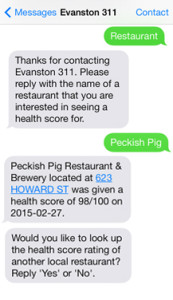Two texts. That’s all it takes to avoid potential stomach pains in Evanston, Ill.
 Or at least, that was the goal behind an endeavor that pairs the city’s restaurant inspection scores on Yelp with text message alerts for diners. When the SMS program launched early in 2015 it was a quiet release. In fact, Erika Storlie, Evanston’s deputy manager, described the undertaking as more of a four-month side project than anything else.
Or at least, that was the goal behind an endeavor that pairs the city’s restaurant inspection scores on Yelp with text message alerts for diners. When the SMS program launched early in 2015 it was a quiet release. In fact, Erika Storlie, Evanston’s deputy manager, described the undertaking as more of a four-month side project than anything else.
The city had just completed a project with Yelp to feed restaurant inspection scores to the review site and wanted to investigate joining the scores with its 311 non-emergency texting app. The problem was, Evanston’s 311 app required a person on the other end to retrieve or record data and submit replies.
“So then, that began the exploration of, ‘Well, wouldn’t it be cool if we could text the restaurant name to 311 and automatically get the inspection score back?’” Storlie said. “It kind of came from the fact we were using these two different types of technologies and we wanted to marry them.”
Whether it’s Evanston’s Kafein coffee house on Chicago Avenue or the Peckish Pig on Howard Street, finding scores is simple. Diners just text “food” to the city’s 311 number, and after a prompt, enter a restaurant name and they’re returned the recent score and inspection date.
It’s simple and much easier than Yelp’s mobile app, which compels users to tap and swipe their way to a restaurant’s “More Info” tab and deep dive through a list of miscellaneous information.
Since Yelp and the texting services launched, Evanston officials said there’s an interest in tracking how public scoring influences health inspections.


 Hope College officials informed the Health Department they had a database that contained all of the students email and text messaging addresses. 3600 students were notified at once.
Hope College officials informed the Health Department they had a database that contained all of the students email and text messaging addresses. 3600 students were notified at once..jpg) “I wrote and sent that e-mail while sitting on the toilet.”
“I wrote and sent that e-mail while sitting on the toilet.” The move to enlist citizen diners seems like another expansion of social networking – the power’s with the people.
The move to enlist citizen diners seems like another expansion of social networking – the power’s with the people.